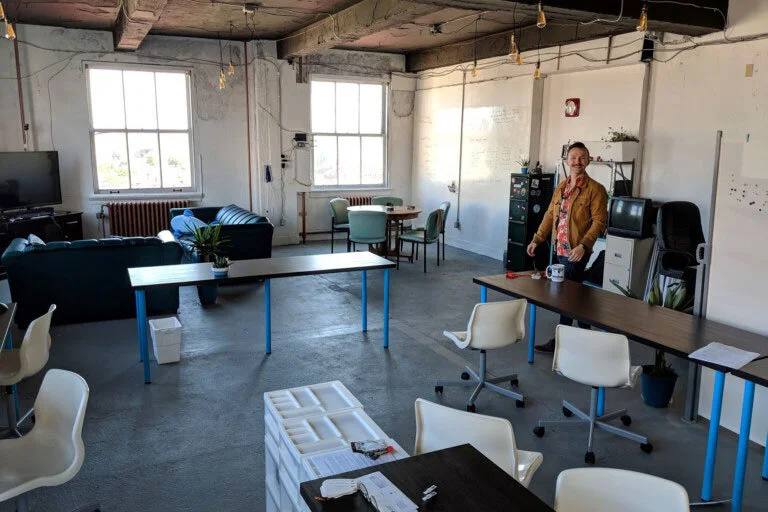Changing the Game: Why Tech’s Most Talented are Relocating to Erie
/Many Erieietes have a love-hate relationship with their hometown. Whether it’s the weather, the economy, the potholes, or perhaps some unattainable standard we can’t reach because we haven’t entirely defined it yet, either way, the reality is that Erie natives are underselling the allure of their lakeside city.
Heck, just talk to an Erie transplant, they love it here! They appreciate its weirdness, how you can stretch a dollar like the elastic waistband on your Thanksgiving pants, and the way you can drive across town in the time it takes most west-coasters to make it out of their parking garages.
One of those transplants is Matt White Ph.D. He was born and raised in Canada by an American parent, so he has dual citizenship but chose the US to call home. While a lot of people joke about moving to Canada if our orange-crush-colored President gets re-elected, Matt could actually make good on that promise.
From Japan to Newfoundland, White seems to have lived in, or traveled to just about everywhere. He’s kind of like Erie’s own Dos Equis man—or like a government agent (a position to which he actually applied). Matt speaks several languages, knows an unusual amount of trivia on a wide variety of topics (I’ve asked him questions ranging from Mexican-street cuisine to excel spreadsheet functions, and he always knows the answer), he can hold his own in the boxing ring, earned his Ph.D. by 25, and most importantly, can make a good drink. And yet, for all his globetrotting, Matt’s in Erie to stay.
Real Estate To Buy For
“Life here is unequivocally better,” notes Matt in his lightning-fast prose. “People from Erie will be like, ‘Erie sucks, blah blah blah.’ But I’m like, ‘Where else have you been, though? Can I move you to Brooklyn for a few months and see if you want to come back to Erie when you live in your $6,500-a-month, 400-square-foot-apartment above a Vietnamese restaurant that’s open 24 hours a day?’”
Although it’s not necessarily what brought him to Erie, the cost of living is a strong selling point. If you look at Zillow’s index, Erie’s current median listing price for a home is $87,700. To put that dollar amount into perspective, the country’s median listing price is $275,000. Our homes are less than a third of the price.
Always Be Learning
Matt’s thoughts come out in rapid-fire succession, but it’s not just babble. Every statement is punctuated with an example, a spot-on statistic, or an overarching point that’s as sharp as a thorn.
Chances are, it has something to do with his epic academic track record. While Matt insouciantly rattles it off like some readers-digest version of the Odyssey, his transcript is impressive. “I skipped one grade in elementary school and did IB (International Baccalaureate) in high school too, so I skipped about three years of college as well. I had my undergrad (English) when I was 19, another undergrad (Education) at 21, Master’s at 22 (Tech Ed.), Ph.D. (cognitive science) at 25… 26? …something like that.”
In the midst of his rapid-fire education, Matt got his start working on some big titles as an academic, studying Scribblenauts, an educational game for Nintendo DS, and World of Warcraft, a massive multiplayer PC game during his Ph.D.
By 19, Matt was teaching high school Drama, and English classes. In his early 20s, he stumbled upon Erie. “Penn State (Behrend) said they wanted someone to totally build out a [game development program] from the ground up—should have a masters degree or better, ideally a Ph.D. in something relatively similar to engineering, and also be working in games,” he says of the college’s strangely-specific job posting. “They did two interviews.” One of which was Matt’s.
Having A Career You (Actually) Like
As far as a strong curriculum vitae is concerned, Matt’s holds some serious weight. By the looks of it, you’d think he had his early career as an educator all planned out, but that’s not quite the case. “My first job ambition was to be a secret agent,” he says with a smile that doesn’t as much say I’m kidding as much as it says, I’m still kind of interested in the job. I did an early interview at CSIS (Canadian Security Intelligence Service), which is sort of Canada’s CIA. Got through a few rounds of the interview process.”
Unfortunately, the secret agent gig wasn’t all it was cracked up to be. “See, in my mind, I was thinking: sleep with gorgeous women, strangle bad guys with piano wire, drink martinis, drive an Aston Martin. That’s what I was imagining when I thought ‘secret agent.’” As it turns out, the job was going to entail parsing through hundreds of wiretaps of people really not doing much of anything at all.
“As I looked more into the job, It turned out I’d just be sifting through hundreds of Arabic language wiretaps every day for the next four years until maybe I got to field agent. “Something about ya’ know, Mohammed is telling Khalid he’s going to pick up groceries, and we’re suspicious about it, so now I have to translate it, and it’s like, he’s literally just buying lamb. So that’s 40 hours a week, every week, for the next four years—it sounded like a prison sentence.”
Although Matt’s dreams of becoming a secret agent never came true, his career path as a professor worked out pretty well. In fact, it was during this time at Penn State Behrend that he met his beautiful wife, Katie. Just recently, they had their first child, McClain.
But we’re talking about a guy who now runs a video game publishing company and also works remotely for the services-giant Keywords Studios. So what the hell happened between teaching high school drama and opening the doors to Whitehorn Digital?
Getting Into the Weeds, Burs, and Whitethorns
In Old English, there was a letter called “thorn.” It once stood where “y” stands today. Those who want to understand the evolution of language will take a look at its pieces. In a similar fashion, to appropriately answer the question of how this once-aspiring secret agent transitions from point X to Z, it’s helpful also to consider what’s in the past.
“When I was a kid we were super poor,” White says in a way that showcases his strength rather than his struggles. “Not college-kid poor, like hunting-because-it’s-mandatory poor.”
As the son of a hairdresser and barber, Matt came from a family that wasn’t raking in much dough as it was. However, when he was three, his father passed away suddenly. His mother was then left to care for four children on a hairdresser’s wages.
To makes matters more challenging, Matt’s father was in the middle of—as White puts it—“A Davy Crockett fantasy.” The family moved out into the middle of nowhere and started building a house, a home that was about half complete when his father passed. “My mom didn’t want me to know we were poor, so she was like, “I’m gonna scrounge and get an NES, and be like, ‘Videogames! Let’s play them together! This is what normal kids do!’”
Matt notes that entertainment in all of its forms—be it sports, music, or video games—can be a coping mechanism for people. “Video games can help us get through some of the not-so-nice-parts of life.” In many ways, the games that his team produces at Whitethorn Digital underscore that notion.
“I’m happy to be publishing things that are a little lighter, a little more ethereal, a little airier, and a little more fun,” Matt says. “I find it very unlikely that we’d ever touch a horror game, for example. Not because we don’t like them, it’s just not our brand.”
Matt likes the “weird stuff.” He says the shoot-‘em-up game market is well-served. He’s looking to break the mold by adding new themes to this cookie-cutter market. “We try to add a little diversity to [the gaming industry]. We feature LGBT characters and people that aren’t just white dudes.” In conjunction with adding some diversity, Matt’s games often tap into that sense of fun we felt when we were kids, before games became characterized by high-definition violence, cringe-worthy stereotypes, and realistic firearms.
“We try to avoid games that mediate people’s interactions with the world down the barrel of a gun. Not that we have any problem with that, I just feel like we don’t need any more,” Matt notes. “I definitely have a lot of nostalgia for the couch. Like being a kid and playing Mario. [Whitethorn Digital] does a lot of couch competitive and couch co-op stuff, where three of four people can just grab a controller and sit together.”
It would appear that for Whitethorn, games aren’t meant to pull you back into the turbulence of real life, but to provide a means of pure entertainment, personal connection, and youthful fun, like some modern-day-digital bonfire around which we can gather.
Redefining The Gaming Industry, Or Any Other
“It’s like the porno industry,” Matt laughs. “You think, that’ll be an easy job. Then you get in there and the labor standards are terrible. If you have a problem, they’ll be like, ‘Get out. 5,000 guys are ready to take this job.’”
The main problem is, there is such an oversupply of would-be game developers and shockingly low demand. For a single developer job post, a company might receive thousands of applications in the first few days. This industry’s over-saturation leads to some additional issues as well. Says Matt: “[Supervisors] will come around and be like, ‘Hey I noticed you only closed 80 story points this week. You know we got 400 applications for your position last time we advertised it, right?’”
The gaming industry is notorious for laying off hundreds of people in one fell swoop, especially if a game flops. “In the game industry, there is a practice of releasing a game and laying everybody off the day after it launches,” Matt says matter-of-factly. “That happens a lot. There are no unions.”
This was the exact scenario of Matt’s first position. “I left before the layoffs…It’s like an animal sensing an earthquake. You sort of know this game isn’t going to break even, and there’s going to be a hundred people without jobs tomorrow.”
In the games industry, there is even a routine practice informally known as a “layoff lunch.” Essentially, everyone who still has a job receives a dispensation to go eat lunch on the company and is told not to come back for the rest of the day. This is so that security can tend to the crying and screaming of those who are told they no longer have a position. “Unfortunately that’s how our industry operates,” Matt says. “It’s one of the reasons I took off and did my own thing. I don’t think people should be worked to death.”
Matt started Whitethorn Digital in 2016, during his California stint at Sony, but the cost of building that company – and the quality of lifestyle he lives while doing it – are far better in Erie than in a West Coast megatropolis. Today, his company has published five games, raised tens-of-thousands of dollars in development capital, and just launched an online IPO.
Put simply: Whitethorn Digital helps indie-game developers with funding and everything that isn’t development. This could include accounting, business structure, sales, networking, and/or marketing. “After leaving PlayStation as a data scientist, I’d done biz dev roles, programming roles, usability roles, and even design roles. I’m kind of like a jack of all trades in this industry, so I can give a top-down perspective.”
Looking for the Remote…Jobs
Presumably, Matt’s to-do list is longer than the Final Fantasy compendium. In the coming months, he’ll be publishing a book on his experiences in the gaming industry, has two jobs, and is the father of a newborn son. So what’s his trick?
“[Remoting working] has certainly made [the work-life balance] much easier…I didn’t plan to work remote or for this to work out that way, although I love that it did,” says Matt. Before landing a remote gig, Matt put in some serious time as an in-house data analyst/scientist for Volition and PlayStation, requiring him to deal with “exorbitantly long work hours, multi-hour commutes, and cutthroat corporate leadership.”
“At PlayStation, or any major studio (or tech company) in California really, you’re fighting two things: the gaming industry’s work hours and the fact that you live in California,” Matt says. “Because of that, these campuses will haul in basic services for you because they know they’re working you too long.”
These campuses have doctors, barbers, counselors, and you-name-it on staff. “They’re fully aware you’re not going to have enough time to get downtown to get a haircut.” To “help out,” these big players in the industry wheel out life’s necessities.
It was during a trim up that Matt finally decided to throw in the towel. “I’m sitting in this tin can in a 100-degree desert, getting my haircut by a guy who is super untalkative,” he recalls. “If you have an untalkative barber that’s like the worst thing in the universe…you’re just left to stew in your own anxieties, basically looking at yourself in the mirror asking yourself, How did I get here?”
It was akin to, as Matt puts it, “a weird facsimile of living a human life.” “It’s an endless grind,” he says. “You wake up at 5:30 AM, make it to your job by 7:30 AM, work until 7:30 PM, and arrive back at home at 9:00, drink a beer, and then go to bed. I came home and was like, ‘Katie, I’m not renewing the lease, we’re going to PA.’ That’s pretty much how I wound up here.”
Joining the Circle
You would think a remote job might come with some big sacrifices, but if you’re an asset to your company, you can call the shots to a certain degree. “I stayed in the same position and have the same California paycheck, but live in PA,” Matt notes.
Matt’s modest about his sociability, but it’s his positive energy and expertise that helps him carry a conversation with anyone, anywhere. “If I’m skilled at two things, it’s talking too much and drinking too much, and I was doing both of those things during an Erie Entrepreneurs gala about a year and a half ago.” This is where he ran into Bill Scholz, co-founder of Radius Cowork. “Bill was like, ‘Hey, we run a coworking space, you should pop in.’ That’s that.”






